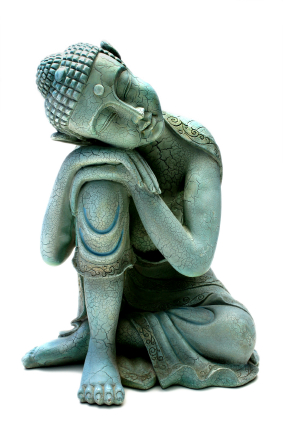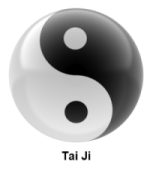
Napping is healthy.
Why doesn’t everyone nap? Maybe it’s for a lack of time. But really, napping makes us more productive. So doesn’t it make sense that it actually saves time?
Napping is healthy because it tailors our activity in accordance with our energy level, which tends to fluctuate throughout the day. This natural ebb and flow of energy defines what is called our circadian rhythm. And napping helps synchronize us with it.
In general, life flows at a certain rhythm. The Chinese understood this universal rhythm, and they memorialized it through the yin-yang symbol. The symbol is called Tai Ji.
Here are some examples of yin-yang cycles:
- day / night
- birth / growth / decay / death
- spring / summer / fall / winter
- crabbiness / pain / cuddliness, or the menstrual cycle
Our circadian rhythm is yet another cycle of yin-yang movements. And it is partly exemplified by the daily fluctuation of our hormones.

The Relationship between Yin/Yang, Circadian Rhythm and Napping
The Tai Ji symbolizes constant movement and change in which yang can represent action, and yin can represent rest. We function best when our yin and yang energies stay balanced as their influence varies throughout the day.
To help maintain energetic balance, we use biochemicals called hormones. Cortisol is a hormone that regulates energy production. It’s known as a stress hormone. That’s because its level rises in response to a greater demand for energy in times of stress. But even in times of peace, cortisol helps maintain blood glucose levels for a steady supply of energy.
In health, our cortisol level – and thus, the amount of glucose available – naturally declines in the late afternoon. That marks a good time for a short rest, after the hustle-and-bustle of a busy day. It helps rejuvenate our mind and body so we can sustain our energy into the evening.
An interesting parallel between Eastern and Western medicine is that the Chinese recognized the late afternoon (3 to 5 pm) as the time when our lung energy is weakest. In Chinese medicine, our lung system is partly responsible for energy production. For in addition to food and water, the air we breathe provides us with energy.
In terms of Chinese medicine, afternoon naps help secure our lung system when it’s least capable of producing energy. When we habitually ask our bodies to push forward instead of napping when our energy is naturally lower, we create a condition of chronic stress. And stress leads not only to disease but to poor efficiency as well.
The Doable Act
The good thing is that it only takes 10-20 minutes of napping to help reduce stress and prevent fatigue. And naps can reasonably be scheduled in the late afternoon.
So the next time you see a yin-yang symbol tattooed on some teenager’s ankle, take it as a reminder to nap each day.
Carl is a former engineer who applies rational thought to the often subjective nature of traditional healing. He practices acupuncture in San Diego, CA.

I love naps! I take one everyday. I just fall asleep for about 20 min and automatically wake up.
Then I’m a new person. Thanks for the reminder.
Hello Carl,
My wife, Eppie, and I have had the genuine pleasure of traveling with your wonderful parents. I had read one other blog of yours and enjoyed that one immensely.
This one resonates well with me not that I am a firm believer and practitioner of taking naps whenever needed, and also when possible, but also because of my background, training and experience. I am a Neurophysiologist with special interest in Sleep Disorders having established the first clinical Sleep Lab in Connecticut along with my affiliation with Yale. My family calls my den as my “Napatorium”. They know where to find
me if I am not on the golf course, or otherwise reading in my favorite nook.
Loved your article. You presented it well and effectively. Congratulations on a job well done. Do send our regards to your parents and thank them for introducing you to us.
More power to you !
fidel and Eppie Exconde
Thanks, Dr Exconde. It’s uplifting when a neurophysiologist can relate to an Eastern point of view.
I like the term, Napatorium. For it suggests a place where you can rest in peace… yet still get up in time for dinner.
I envy my husband who can nap at a drop of a hat. But for me, If I nap, I would not be able to sleep in the evening. Why is that?
By the way, we enjoy traveling with your parents. We just came back from Israel with them.
Leticia,
If napping disrupts your nighttime sleep, it might be due to the timing and duration of your naps. If you nap too long, you may enter a deeper phase of sleep that is similar to nighttime rest. This could throw your circadian rhythm off balance. Napping too late in the day can also be disruptive.
We’re all unique. Maybe you have yet to find your ideal napping scenario. Try shorter naps, starting with about 10 minute durations, at some time between 2p and 4p. Another guideline is to try napping around 8 hours after you wake in the morning.
If napping still seems disruptive, then maybe you’re just not as lucky as the rest of us. Thanks for you comment.
I took a much needed nap this afternoon… same as almost every day. I feel them coming and just give into them. I didn’t used to do that. It seemed indulgent and lazy. Now I realize that it’s the only way for me to continue being productive. Sometimes I only need a few minutes. Other times, I need an hour or more. My body knows and I try to listen. I also do my best to not schedule anything in the late afternoons. I’d hate to fall asleep in a meeting. 🙂
Sugar,
You bring up a good point — listen to our bodies.
I’m assuming your meetings are productive. Sometimes, meetings can be the best time for a nap.
Ummm! I think I need a nap.
The hours of the lungs in Tradition Chinese Medicine (TCM) are 3-5 a.m. not p.m. 3-5 p.m. is the bladder followed by the kidneys. Regardless, the kidneys have the adrenals sitting on top of them. In TCM, they are the root of all our willpower. A nap still helps in those times.
That’s true–lung energy is thought to peak around 3-5am. That is why I wrote that, theoretically, lung energy would be weakest around 3-5pm (i.e. halfway through its 24-hr cycle).